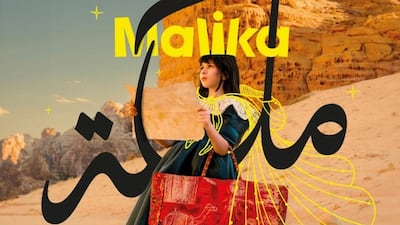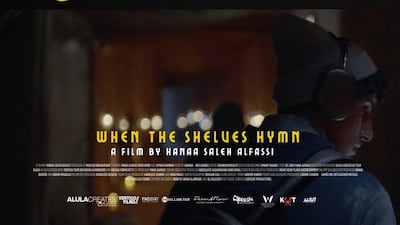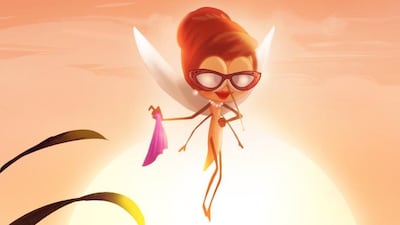AlUla Creates, the female-only initiative dedicated to nurturing Saudi filmmakers and fashion designers, recently showcased the results of its first cohort at the Red Sea International Film Festival.
It is funded by Film AlUla, the Royal Commission for AlUla's film agency, and is one of Saudi Arabia’s Vision 2030 initiatives. Dozens applied to take part in the inaugural programme with a handful selected and paired with mentors led by Haifaa Al Mansour (The Perfect Candidate, Wadjda), James Richardson and Jane Moore of Vertigo Films and Roua Almadani of Film AlUla.
Three shorts were created, all of which were screened at the festival in Jeddah. These include Malika, When the Shelves Hymn and the animation A Mosquito.
“We're very excited to be completing the first cycle of AlUla Creates,” said Mahsa Motamedi, marketing director of Film AlUla. “We’re here to nurture and celebrate creativity and empower women in this in this region. I think we've been successful at that by showing how the participants made these short films and we're showing it on an international platform.”
One of the short films, Malika, even competed at the festival. Directed by Maram Taibah, the film takes cues from Alice in Wonderland and Arabian Nights. It tells the story of Salma, a girl who sets out to find her grandmother’s lost crown so that she will be healthy again.
The programme, Taibah said, helped develop the film from as early as the scriptwriting stage. “There were drafts going back and forth with really valuable feedback that helped us to shape our script,” she said, describing how mentors were present at “every stage” of the film to offer guidance.
“I was directing a little girl,” she said. “In some ways, I felt a little bit challenged to get her to be more spontaneous, to get her to give a specific kind of performance. Haifa came to set, and I sat with her and asked her how she recommended I handle the scene. She was very instrumental in what I learned.”

The mentorship programme was also vital in the pre-preparation phase, Farah Jouni, producer of Malika, said. “They gave us a lot of a lot of notes, especially on the budget, on the schedule,” she said. “They were visiting us on set, making sure that everything was fine and everything was on track.”
AlUla Creates was also essential in helping the Malika team develop the visual character and costumes of the film, namely by connecting them to Atelier Hekayat, a fashion house founded by Alia and Abeer Oraif, who were also selected as part of AlUla Creates.
The sisters, along with Arwa Al Ammari of the ArAm label, were the talents selected to take part in the fashion aspect of AlUla Creates. The designers were mentored by Emilia Wickstead, one of the regular dressmakers for Kate, Princess of Wales. As part of AlUla Creates, the designers dressed supermodels Helena Christensen and Eva Herzigova at the Oscar’s Vanity Fair after-party.
While Atelier Hekayat has had years of experience within the fashion industry, AlUla Creates helped them explore a new niche, designing for film, said Alia. “We read the script and we lived it so that we can make designs for it,” she said. “We wanted to communicate the vision of the film. It was extremely exciting.”
Among the most memorable and challenging designs that Atelier Hekayat created for Malika was a handbag that was supposed to fit a sword. “The script said that the character puts a sword in the handbag, Alia added. "How were we supposed to accommodate that? We finally thought of having a zipper at the bottom of the bag so that the sword can pass through."

Al Ammari, who designed the clothes for When the Shelves Hymn, said her experience was also similar, making her think of design in a whole new way. “This was our first experience in creating fashion for a film,” she said. “We took a different path than what we usually do. We had to read the script and understand what they were trying to convey. Clothes can convey feelings.”
As a major part of When the Shelves Hymn, directed by Hanaa Saleh Alfassi, takes place in an antique shop in AlUla, Al Ammari said she wanted to stay true to the visual language of the film. “It had to give this vibe of the authenticity of Saudi Arabia in a historical sense," she added. "For instance, the thawb we designed was inspired by the Saudi thawb, but so was the dagla. We mixed the both and created a hybrid.”
Being an animation, the process for A Mosquito was quite different to the other short films. The film is set in AlUla in 1969 and follows a small mosquito named Zozo that yearns to become a singer and, as the premise reads, “as famous as Umm Kulthum".
The film, directed by sisters Dana and Raneem Almohandes, initially began as a two-minute university project before being picked up by AlUla Creates. “They helped us to develop to seven minutes in terms of story and the characters,” Dana said. “We developed more with the feedback and notes.”
The sisters went to AlUla to draw inspiration from the landscape for their film. “We were so lucky to be in the space,” Raneem added. “It was our third time there, but this time was different. We were thinking about the story while being there, and we actually filmed videos that we animated later on.”

The sisters focused on aspects of the landscape by thinking from the perspective of a mosquito. “We were filming the tiny flowers, everything that is so small to include in the film, because it's Zozo's perspective," she added. "Even during the helicopter ride, we thought this was a bit of what she sees.”
All three films have secured distribution deals, meaning they will soon be accessible to a larger audience. “It is very exciting because that's the idea of AlUla Creates,” said Motamedi. “At the end of the day, the distribution is very important.”
She revealed lessons were learnt from the first batch of AlUla Creates. Subsequent iterations, she said, will focus on fashion designers working on costume design, as opposed to offering a wider fashion platform.
“We started off, and I think the fashion side was the first bit that we launched, and then we got the film submissions done," she added. "So we did it backwards. Now we’re in a better position because we know what worked and what didn't work to concentrate on what we do best, which is filmmaking and costume design.”

